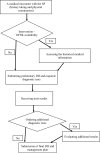The impact of electronic health records on the ordering of medical tests
- PMID: 40165331
- PMCID: PMC11956437
- DOI: 10.1186/s13584-025-00679-3
The impact of electronic health records on the ordering of medical tests
Abstract
Background: Healthcare facilities often encounter patients with incomplete records from previous visits, leading to duplicated tests. Recent Electronic Health Records (EHR) investments aim to address this issue. This study examines how viewing patient information via OFEK EHR affects the frequency of tests ordered by the physician. The OFEK system, developed in Clalit Health Services, is an advanced online medical records system used in hospitals. It was expanded to all hospitals and HMOs starting in 2013, allowing medical information to be shared and accessed in the Israeli healthcare system.
Methods: The study was conducted at the Israel Center for Medical Simulation (MSR), with 26 physicians engaged in encounters with simulated patients (SP). The SPs provided relevant clinical histories and signs for two abdominal pain cases. The physicians ordered diagnostic tests, and after receiving the tests' results they set a final diagnosis and could order additional tests. They had randomized access to the OFEK system to vary test-ordering patterns. In both scenarios, we examined three key variables to see if access to the OFEK system influenced the decision to order diagnostic tests ("QTestsBefore" - the number of tests ordered by the physician after the patient visit; "QTestsAfters" - the number of tests ordered by the physician after receiving the results of the first round; "QSumTests" - The total number of tests).
Results: In the study group with access to the OFEK EHR, an average of 5.5 tests were ordered, compared to 6.85 in the control group (p-value = 0.01). Ordinary Least Squares regressions confirmed that the overall number of tests, particularly the second round ordered after receiving initial results, was significantly lower with OFEK. Additionally, years of clinical practice also correlated with fewer ordered tests.
Conclusions: The findings show that the OFEK EHR system reduces the number of medical examinations by allowing physicians to access medical histories and past tests, which supports efficient decision-making. This leads to fewer ordered medical tests and, thus, reduces the time procedures patients spend in EDs or hospitals. Efficient decision-making and fewer redundant medical tests can improve patient flow, free up resources, and reduce overcrowding in emergency departments.
Keywords: Electronic health records; Medical information; Medical test.
© 2025. The Author(s).
Conflict of interest statement
Declarations. Ethics approval: Helsinki Approval was given by Sheba Medical Center (0091–12-SMC). Ethics approvals were given by Ono Academic College (202006ono) and at the beginning stage by Tel-Aviv University. Consent for publication: Not applicable. Competing interests: The authors have no conflict of interest.
Figures
References
-
- Aceto G, Persico V, Pescapé A. The role of information and communication technologies in healthcare: taxonomies, perspectives, and challenges. J Netw Comput Appl. 2018;107:125–54.
-
- Ahituv N, Igbaria M, Sella A. The effects of time pressure and completeness of information on decision making. J Manag Inf Syst. 1998;15(2):153–72.
-
- Atasoy H, Chen P-Y, Ganju K. The spillover effects of health it investments on regional healthcare costs. Manage Sci. 2018;64(6):2515–34.
-
- Ayabakan S, Bardhan IR, Zheng Z, Kirksey K. The impact of health information sharing on duplicate testing. MIS Quarter. 2017;41(4):1083–103.
MeSH terms
LinkOut - more resources
Full Text Sources
Medical
Miscellaneous


